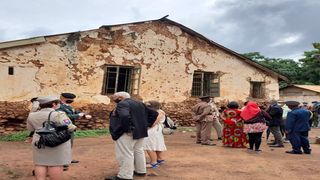
Photo of Old Taveta police post in Taita Taveta county where the first shot was fired in 1914 to mark the beginning of World War One. The historical site is dilapidated due to neglect. Calls have been made for the government to preserve the heritage to promote battlefield tourism in the area. LUCY MKANYIKA I NATION MEDIA GROUP
|Mombasa
Premium
Kenya’s WW1 history endangered as historical site falls into ruins
An important World War One historical site in Taita-Taveta county has fallen into ruins.
The old Taveta Police Station, from where the first shot of the East African campaign was fired in August 1914 heralding the start of the war, requires conservation.
The important historical building has long been abandoned. Made from stones and mud, the house is now in ruins and the walls have started to peel and fall off, threatening its existence and the important history it holds.
Over the past six years, the structure has been partially destroyed and a tour to mark centenary commemorations since the end of the war on Saturday revealed a sad, dilapidated state of the building that holds an important history of the war.
In recent years, the building used to house families of prisons officers from the Taveta Maximum Prison but its dilapidated state forced the families to seek accommodation elsewhere.
Located along the Voi-Taveta highway and within Taveta town, neighbouring the Deputy County Commissioner's offices and the area National Government Constituency Development Fund (NG-CDF) offices, the building offers a great potential as a tourist attraction that could benefit the area.
Calls have been made for the government to preserve the heritage to promote tourism in the area.
Taita-Taveta Deputy Governor Majala Mlaghui said there was a need to protect and preserve historical sites since they can turnaround the economy of the county and the country through tourism.
She, however, said little can be done at the county level since the building is the property of the national government.
"We must protect such sites for our future generations. However, lack of funds hinders us from doing much. We will work with stakeholders to see what can be done to preserve this building," she said.
Over a century ago, Taita-Taveta was the site of the battle in the East African campaign of WW1.
After the war was declared, Taveta became one of the bloodiest battlefields in the conflict pitting British soldiers and Germans from 1914-1918.
To benefit from the history, the government has developed World War One battlefield packages as a new cultural heritage site for tourists.
Visitors tour Mwashoti hill, which was a British fort, the Voi-Taveta railway, built by the British to fight Germans, Salaita Hill which was one of the battlefields, war graves in Voi, Maktau and Taveta and the old Taveta police post where the first shot of the war in East Africa was fired.
Tourist attraction
Taita Hills Safari Resort and Spa has already embraced the new package and has been hosting a series of events to increasingly make the package popular.
On Saturday, Brigadier Joakim Mwamburi and Ms Mlaghui led a delegation of guests from seven countries to participate in celebrations to mark the end of World War I in Taita-Taveta county.
The commemorations kicked off on Friday evening where guests were led in a wreath-laying ceremony at the Voi Commonwealth War Graves.

Brigadier Mark Thornhill, Defence Advisor of the British High Commissioner, Kenya salutes next to a monument at Maktau Indian Cemetery, Taita Taveta county in honour of soldiers who took part and died in World War One. A memorial service was also conducted at Voi War Graves and at the Taveta Common Wealth War Graves.
A memorial service at Maktau Indian Cemetery and the Taveta Commonwealth War Graves was also conducted to remember those who died in the battle.
Among the countries that participated are the United Kingdom, Tanzania, South Sudan, Belgium, Malawi, Qatar, Denmark, Serbia and the Czech Republic.
Brigadier Mark Thornhill, who is the Defence Adviser of the British High Commissioner Kenya, said it was important to remember those who sacrificed for the freedom of those who came after them.
He said this year's theme, which is ''The Unremembered'', is meant to celebrate men who used to transport ammunition, food and other supplies to both German and British soldiers.
African soldiers and carriers, who served with the army in East Africa during the First World War, were buried in unmarked graves unlike Germans, British and Indian soldiers.
The carrier corps and workers built and maintained roads and railway lines and played a vital role in the war.
"We are aware that the remembrance, which was done a century ago, is different from what we are doing today. Today is a tribute to all soldiers including those who do not have headstones. Their service and sacrifice have not been forgotten," he said.
He said they are also providing an opportunity for residents to remember their forefathers and also benefit from battlefield tourism.
It is believed that over one million Kenyans were involved in the war as soldiers and porters.
Brigadier Mwamburi said the government was working to recognise Kenyans who took part in the war.
"Their records are not clear but we are digging into the archives to find their names and have their headstones incorporated in these memorials," he said.



